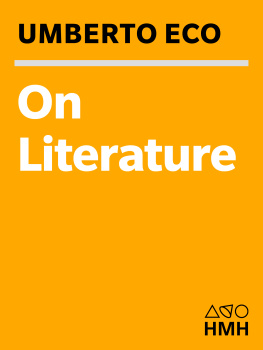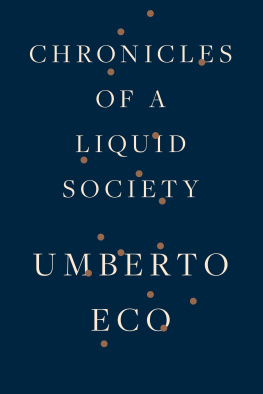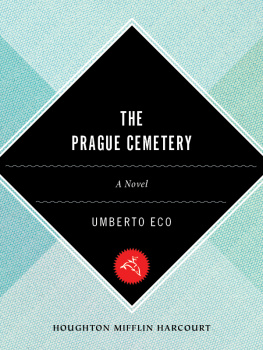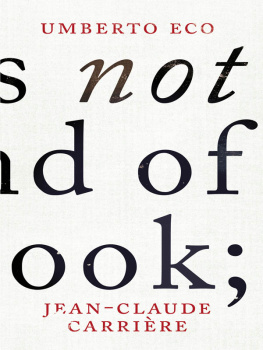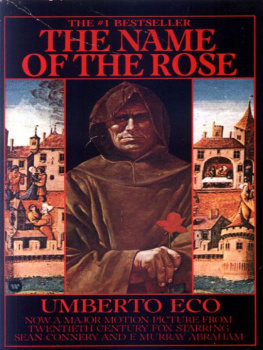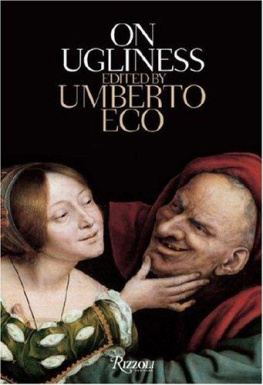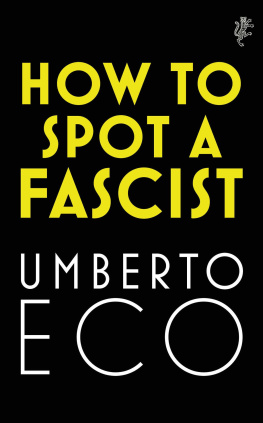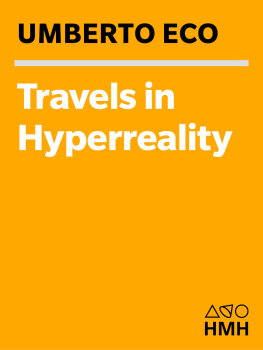2002 RCS Libri S.p.A
English translation copyright 2004 by Martin McLaughlin
All rights reserved. For information about permission to reproduce selections from this book, write to or to Permissions, Houghton Mifflin Harcourt Publishing Company, 3 Park Avenue, 19th Floor, New York, New York 10016.
hmhbooks.com
This is a translation of Sulla Letteratura.
The Library of Congress has cataloged the print edition as follows:
Eco, Umberto.
[Sulla letteratura. English]
On literature / Umberto Eco; translated from the Italian by
Martin McLaughlin.1st U.S. ed.
p. cm.
Includes bibliographical references.
ISBN 0-15-100812-4
1. LiteratureHistory and criticism. I. Title.
PN85.E4313 2004
809dc22 2004010664
ISBN 0-15-100812-4
eISBN 978-0-547-54304-8
v2.0620
Introduction
This book gathers together a series of occasional writings, though all of them are concerned with the problem of literature. They are occasional in the sense that they were stimulated by the title of a conference, symposium, congress, or volume to which I had been invited to contribute. Sometimes being constrained by a theme (even though one clearly goes to conferences whose theme is closely linked to ones own interests) helps to develop a new thought, or simply to restate old ones.
All the pieces have been rewritten for this volume, sometimes abbreviated, sometimes expanded, sometimes trimmed of references that were too closely tied to the occasion. But I have not tried to hide this very quality, their occasional character.
The reader will be able to spot the return, in different essays, and perhaps even at some years distance, of the same example or theme. This seems natural to me, since each one of us carries our own baggage of illustrative literary places. And repetition (so long as it does not actually disturb the reader) serves to highlight these.
Some of these writings are also, or, rather, especially, autobiographical or autocritical, in the sense that I speak of my own activity not as a theorist but as a practicing writer. As a general rule I do not like to confuse the two roles, but sometimes it is necessary, in order to explain what one means by literature, to turn to ones own experienceat least in informal occasions like the majority of those in this book. Moreover, the genre of statement of poetics is one that is authorized by a venerable tradition.
On Some Functions of Literature
Legend has it, and if it is not true it is still a good story, that Stalin once asked how many divisions the Pope had. Subsequent events have proved to us that while divisions are indeed important in certain circumstances, they are not everything. There are nonmaterial forces, which cannot be measured precisely, but which nonetheless carry weight.
We are surrounded by intangible powers, and not just those spiritual values explored by the worlds great religions. The power of square roots is also an intangible power: their rigid laws have survived for centuries, outliving not just Stalins decrees but even the Popes. And among these powers I would include that of the literary tradition; that is to say, the power of that network of texts which humanity has produced and still produces not for practical ends (such as records, commentaries on laws and scientific formulae, minutes of meetings or train schedules) but, rather, for its own sake, for humanitys own enjoymentand which are read for pleasure, spiritual edification, broadening of knowledge, or maybe just to pass the time, without anyone forcing us to read them (apart from when we are obliged to do so at school or in the university).
True, literary objects are only partly intangible, since they usually come to us on paper. But at one stage they came to us through the voice of someone who was calling on an oral tradition, or written on stone, while today we are talking about the future of e-books, which apparently will allow us to read a collection of jokes or Dantes Divine Comedy on a liquid-crystal screen. Let me say at once that I do not intend to dwell this evening on the vexed question of the electronic book. I belong, of course, to those who prefer to read a novel or poem in the paper medium of books, whose dog-eared and crumpled pages I will even remember, though I am told that there is now a generation of digital hackers who, not having ever read a book in their lives, have now enjoyed Don Quixote for the first time thanks to the e-book. A clear gain for their minds but at a terrible cost for their eyesight. If future generations come to have a good (psychological and physical) relationship with the e-book, the power of Don Quixote will remain intact.
What use is this intangible power we call literature? The obvious reply is the one I have already made, namely, that it is consumed for its own sake and therefore does not have to serve any purpose. But such a disembodied view of the pleasure of literature risks reducing it to the status of jogging or doing crossword puzzlesboth of which primarily serve some purpose, the former the health of the body, the latter the expansion of ones vocabulary. What I intend to discuss is therefore a series of roles that literature plays in both our individual and our social lives.
Above all, literature keeps language alive as our collective heritage. By definition language goes its own way; no decree from on high, emanating either from politicians or from the academy, can stop its progress and divert it toward situations that they claim are for the best. The Fascists tried to make Italians say mescita instead of bar, coda di gallo instead of cocktail, rete instead of goal, auto pubblica instead of taxi, and our language paid no attention. Then it suggested a lexical monstrosity, an unacceptable archaism like autista instead of chauffeur, and the language accepted it. Maybe because it avoided a sound unknown to Italian. It kept taxi, but gradually, at least in the spoken language, turned this into tass.
Language goes where it wants to but is sensitive to the suggestions of literature. Without Dante there would have been no unified Italian language. When, in his De Vulgari Eloquentia (On Vernacular Eloquence), Dante analyzes and condemns the various Italian dialects and decides to forge a new illustrious vernacular, nobody would have put money on such an act of arrogance, and yet with The Divine Comedy he won his bet. It is true that Dantes vernacular took several centuries to become the language spoken by all of us, but if it has succeeded it is because the community of those who believed in literature continued to be inspired by Dantes model. And if that model had not existed, then the idea of political unity might not have made any headway. Perhaps that is why Bossi does not speak an illustrious vernacular.
Twenty years of Fascist talk of Romes fated hills and ineluctable destinies, of unavoidable events and plows tracing furrows in the ground, have in the end left no trace in contemporary Italian, whereas traces have been left by certain virtuoso experiments of futurist prose, which were unacceptable at the time. And while I often hear people complain about the victory of a middle Italian that has been popularized by television, let us not forget that the appeal to a middle Italian, in its noblest form, came through the plain and perfectly acceptable prose of Manzoni, and later of Svevo or Moravia.
By helping to create language, literature creates a sense of identity and community. I spoke initially of Dante, but we might also think of what Greek civilization would have been like without Homer, German identity without Luthers translation of the Bible, the Russian language without Pushkin, or Indian civilization without its foundation epics.

